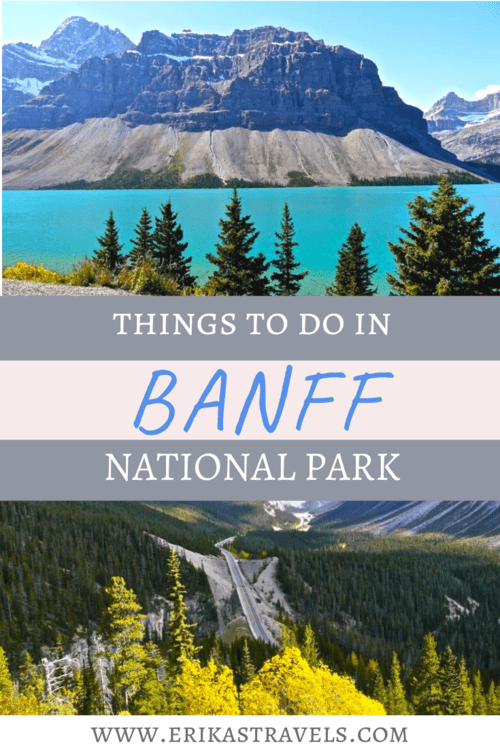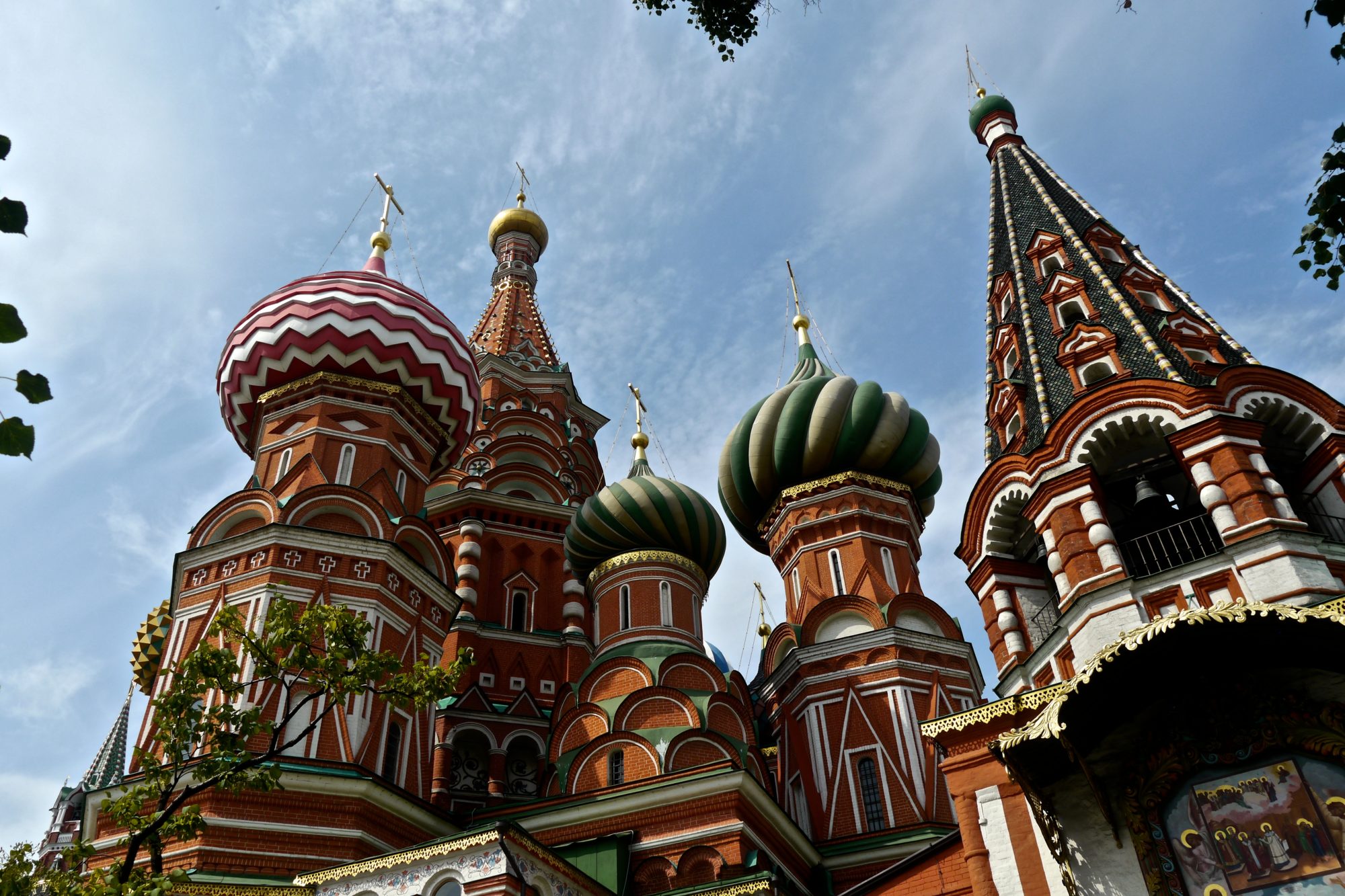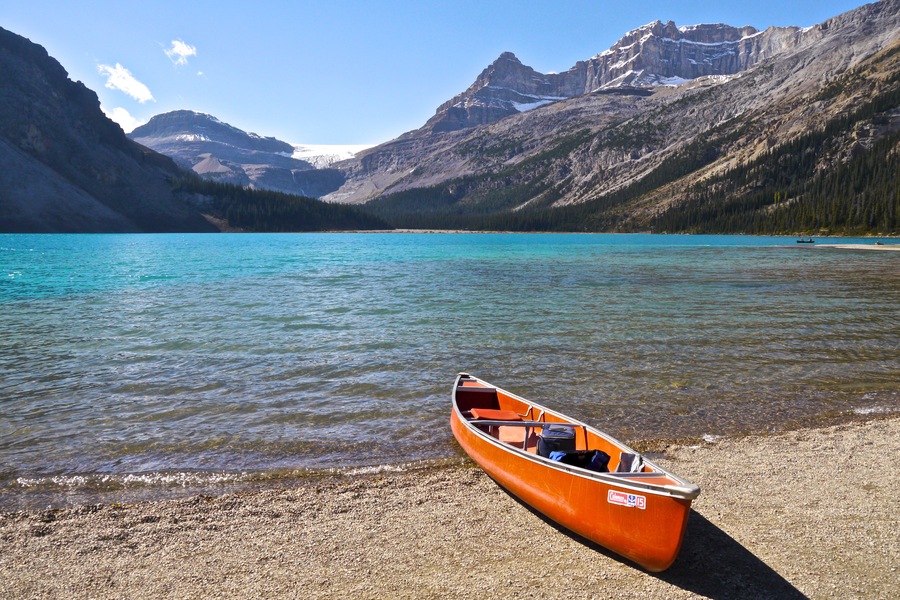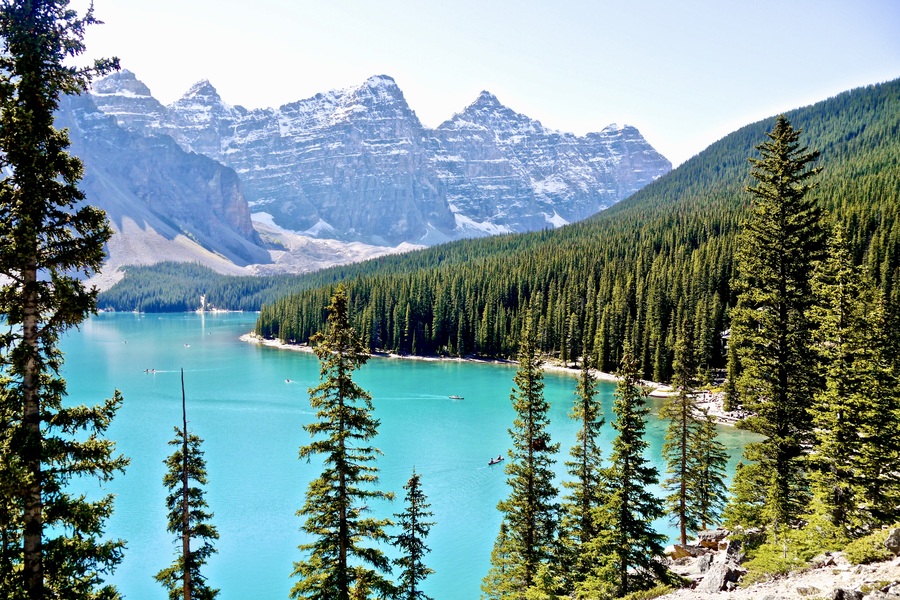
Banff National Park: Jewel of the Canadian Rockies
‘Amazing’ might be one of the most overused words in the English language. We use it to describe everything from food to places to moods to people.
Yet, as Dan and I drove into the Canadian Rockies and craned our necks to see the majestic peaks of Banff National Park in Alberta, I could think of no other word to adequately describe what I was seeing.
Throughout our short Canadian Rockies road trip, I would try time and time again to come up with words that could convey the majesty of our surroundings.
But every time, I came up short.
Banff National Park is simply amazing. Words cannot possibly do its beauty justice.
BANFF NATIONAL PARK IN THE CANADIAN ROCKIES
Banff National Park is the most renowned place to visit in Canada’s National Park System. Surrounded by Jasper, Yoho and Kootenay, it is the crown jewel of an area that overflows with riches.
The national park lies at the heart of the dramatic Rocky Mountains—a chain of peaks that boasts some of the most incredible scenery in North America. In addition to housing many of Canada’s most beautiful parks, the Rockies encompass Glacier National Park, the Grand Tetons, and the mountains of western Colorado.
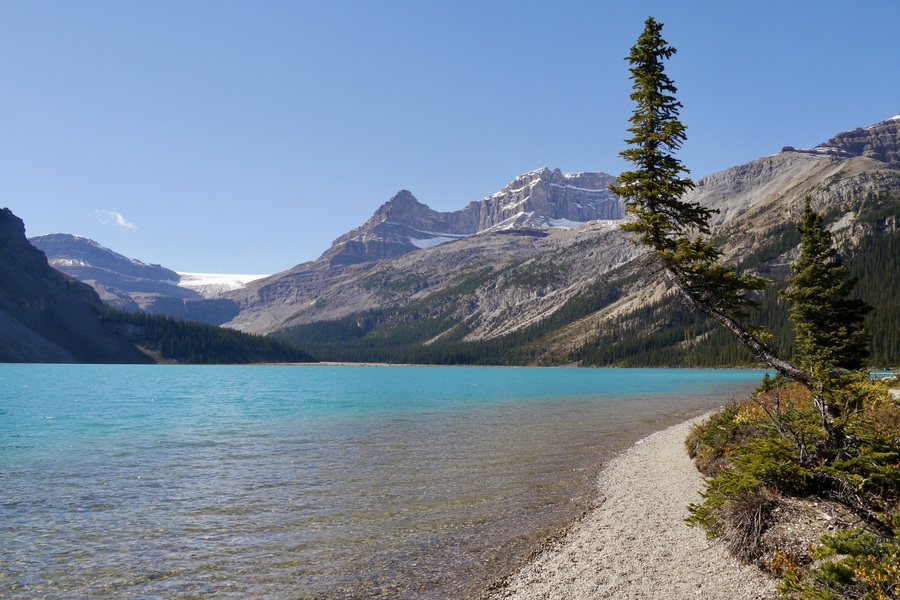
Established in 1885, Banff is one of the world’s oldest national parks. The Canadian park attracts millions of visitors each year to its towering mountain peaks and impossibly blue lakes.
In recognition of its geology and natural beauty, UNESCO has included it among its selective list of World Heritage Sites.
TOP BANFF ATTRACTIONS
While you could easily fill a multi-week itinerary with incredible Banff attractions, there are a few unmissable highlights that should be on everyone’s radar.
MORAINE LAKE
Lake Moraine is the typical image of Banff that you’ll see plastered on magazine covers. A beautiful glacial lake nestled in the Valley of the Ten Peaks, the oft-photographed body of water is one of the most beautiful places in Banff.
Lake Moraine gets its distinct turquoise color from chalky rock flour that has been deposited into the lake over millennia due to glacial erosion.
Dan and I stopped by Lake Moraine during our first day in Banff. From atop a lakeside rock pile, we soaked in the postcard-worthy panoramas of the lake’s pristine surroundings.
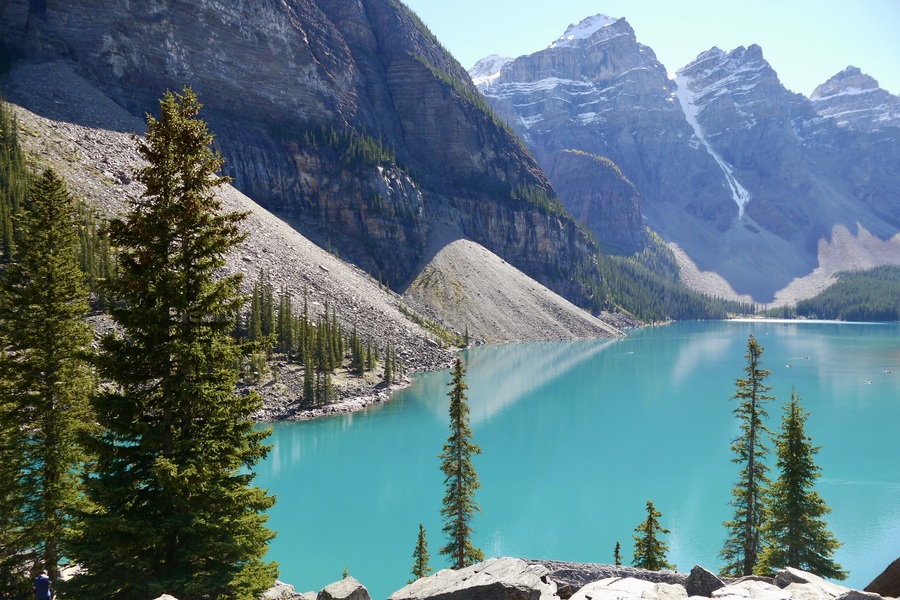
While Lake Moraine is among the most popular places to visit in Banff, its photogenic scenery is absolutely worth the hype.
If you wish to experience the lake without dozens of selfie sticks blocking your view, I suggest you avoid visiting midday.
LAKE LOUISE
Lake Louise is one of Canada’s most iconic lakes and a top place to visit along the Icefields Parkway.
The glacial lake has a striking turquoise hue that glistens in the sun. Like Lake Moraine, its color comes from rock flour that is carried into the lake by melt-water from the surrounding glaciers.
Lake Louise is more than just a photogenic backdrop. The mirror-like lake is a starting point for many hiking trails in Banff–including the spectacular Plain of Six Glaciers.
The lakeshore is also a popular launching pad for mountain biking and canoeing trips.
In the winter, the slopes around Lake Louise transform into one of the largest ski areas in North America.
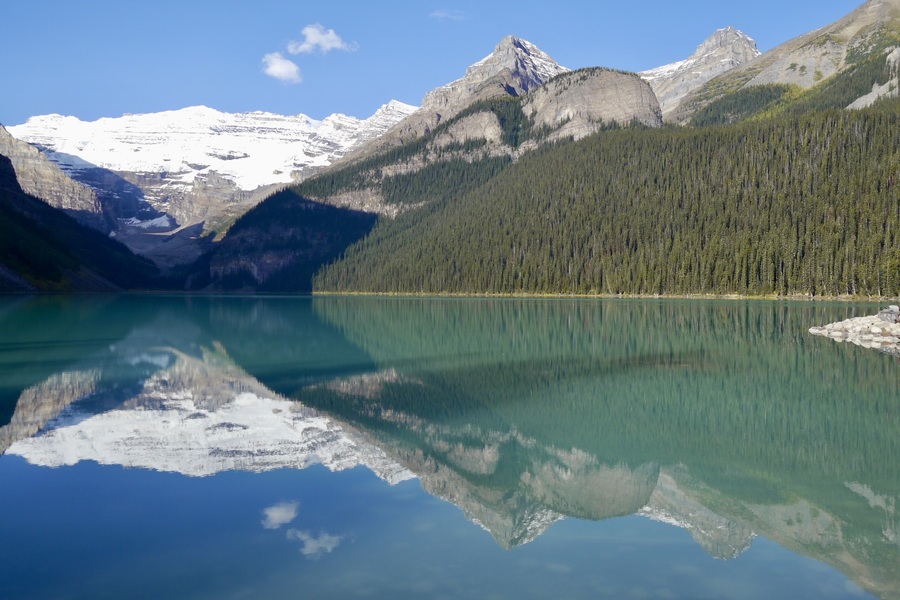
Situated at the northeastern end of Banff’s Lake Louise, you’ll find the historic Fairmont Chateau. The storied hotel dates back to the 1890s and offers spectacular views from its doorstep.
PLAIN OF SIX GLACIERS HIKE
From Lake Louise, we hiked the Plain of Six Glaciers–a seven mile roundtrip path that has become a mainstay on many Canadian Rockies itineraries. The hike passes through rugged mountain scenery and provides hikers with awe-inspiring views.
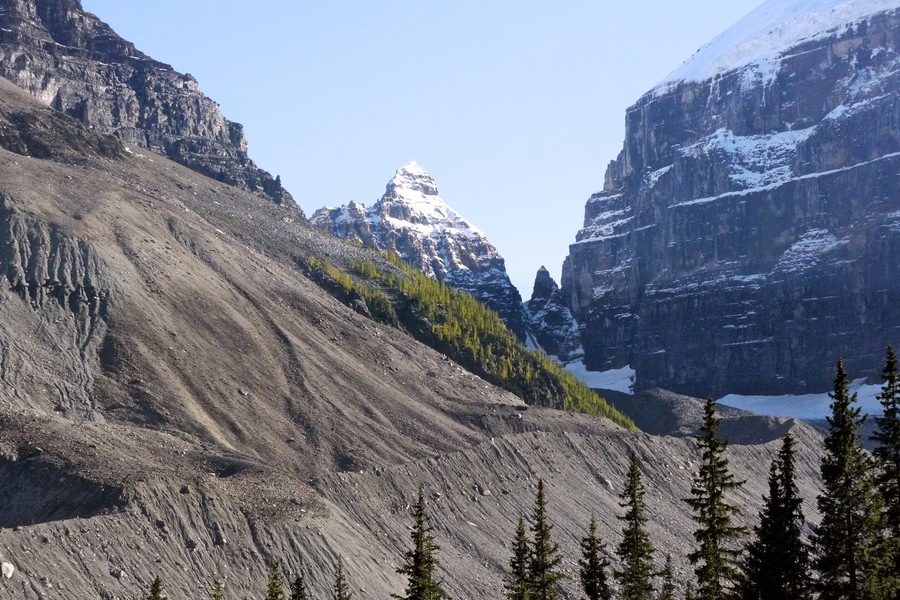
Starting as a gentle stroll along the edge of Lake Louise’s placid waters, it gradually runs uphill—past waterfalls, glaciers and barren rock faces—to the famous Lake Agnes Teahouse.
JOHNSTON CANYON
Johnston Canyon is one of the top places to visit in Banff.
But in my hurry to see the park’s iconic lakes, I managed to skip the area entirely.
The Johnston Canyon’s main draws are its two picturesque waterfalls. A series of man-made bridges takes you through the rocky landscape, showcasing the cascades from different angles.
If you continue on the trail past Upper Falls, you’ll come across colorful glassy springs called the Ink Pots.
Next time I visit Banff, the canyon’s hiking trails will be a top priority.
THE ICEFIELDS PARKWAY TO JASPER NATIONAL PARK
Rated as one of the most beautiful drives in the world by Condé Nast Traveller, the Icefields Parkway is a 232km scenic highway that cuts through jagged mountain peaks and sweeping valleys.
The highway begins just off the Trans-Canada Highway 1, near Lake Louise. Driving the Icefields Parkway is one of the top things to do in Banff and an undeniable highlight of the Canadian Rockies.
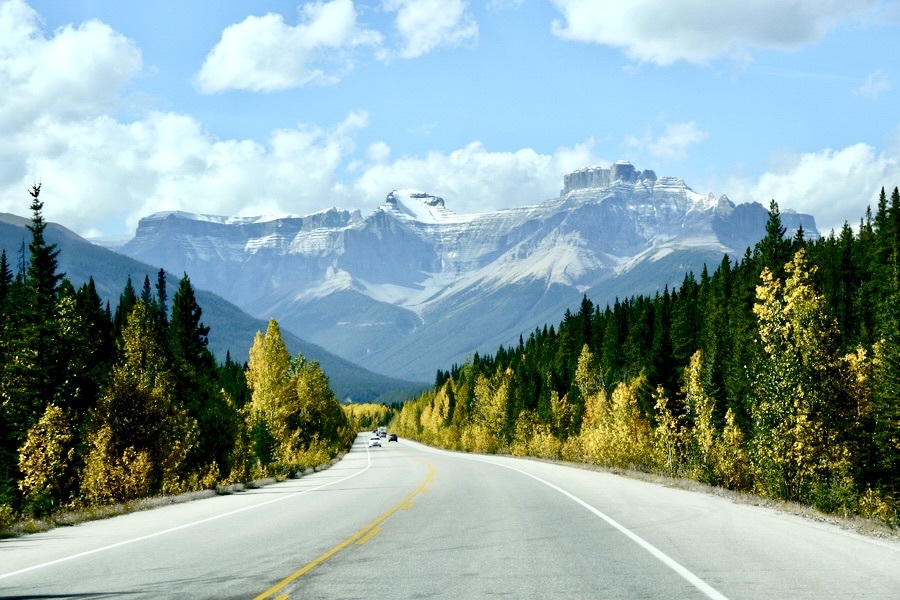
Though driving the Icefield’s Parkway only takes a couple hours from start to finish, Dan and I spent all day exploring the route—stopping for pictures of dazzling turquoise lakes and gaping at its glacier-adorned mountains.
Along the road we saw elk, mountain goats and bighorn sheep.
-
BOW LAKE
Beautiful Bow Lake sits north of Lake Louise, along the Icefields Parkway. Its dramatic mountain-ringed setting offers spectacular vistas and plenty of photo opportunities.
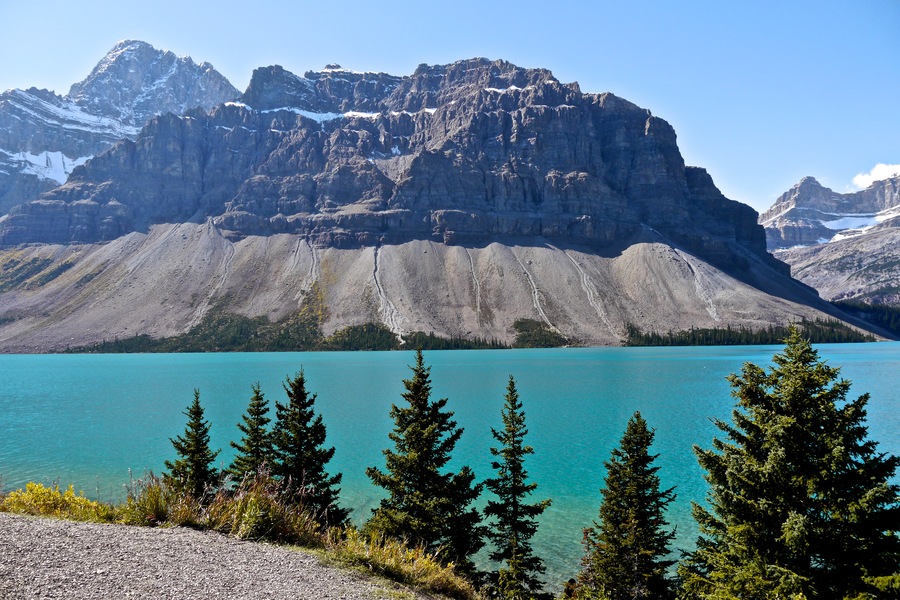
The sheer rock wall of Crowfoot Mountain, the hanging glacier, and the expansive Wapta Icefield create a dazzling backdrop to the lake’s shimmering waters.
Level pathways along the lakeshore provide family-friendly hiking opportunities.
-
PEYTO LAKE
Merely five minutes from Bow Lake, lies milky-blue Peyto Lake—one of the most iconic images of the Canadian Rockies and yet another highlight of Banff National Park.
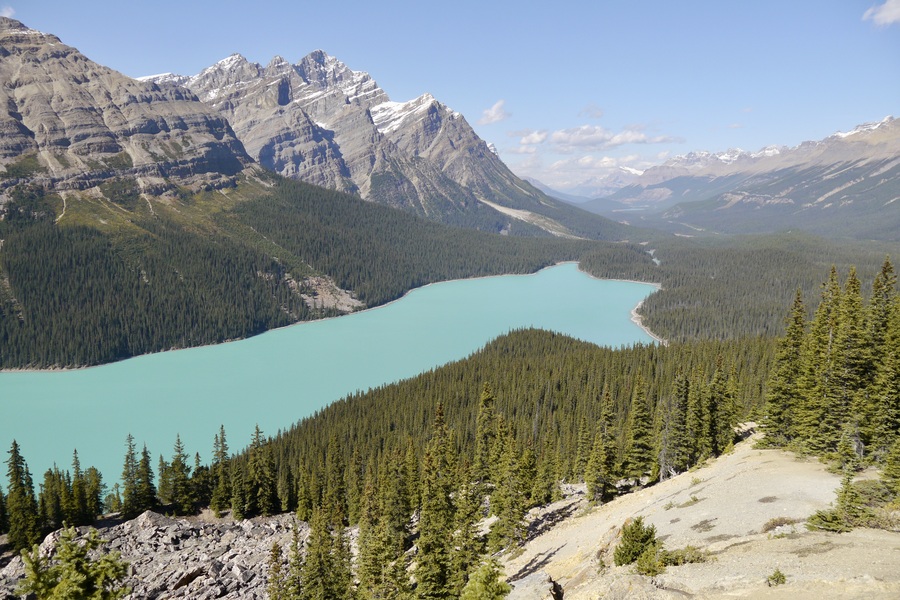
The Peyto Lake Lookout sits less than half a mile from the Icefields Parkway. Its viewing platform is the best place from which to photograph the turquoise lake and its towering mountain backdrop.
-
WATERFOWL LAKES
Easily accessible from the Icefields Parkway, the Waterfowl Lakes are beautiful yet seldom-mentioned.
The two bodies of water don’t have the milky hue of some of Banff’s other lakes, but they are nonetheless spectacular—framed by glacier-studded mountains and towering coniferous trees.
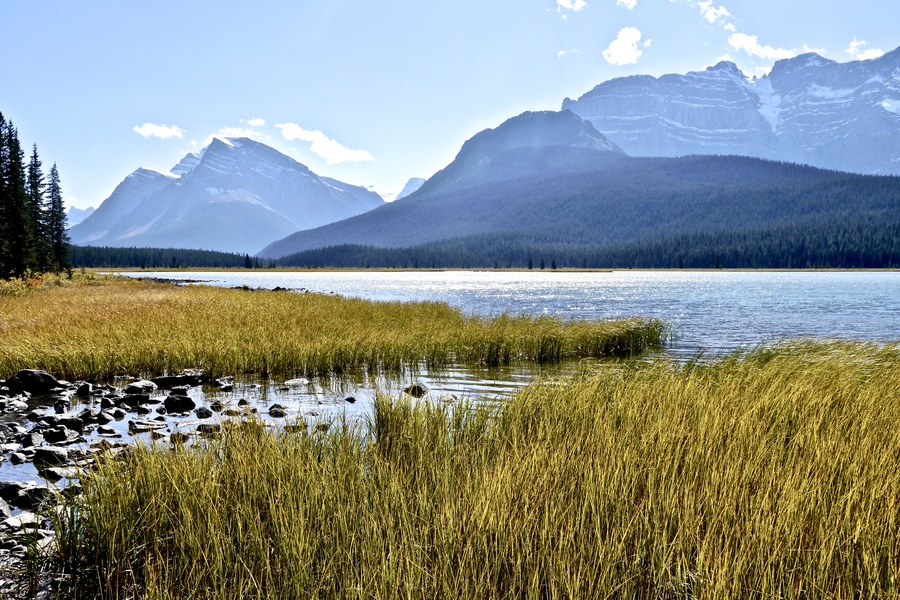
At the Waterfowl Lakes, you’ll find a campsite and short family-friendly walking trails.
-
BIG BEND
As we neared the confines of Banff National Park, the scenery began to change. The glaciers and peaks became fewer and farther between and, in their stead, we saw more granite cliff faces and sweeping panoramas. We noticed more yellow deciduous trees dotting the emerald coniferous forest.
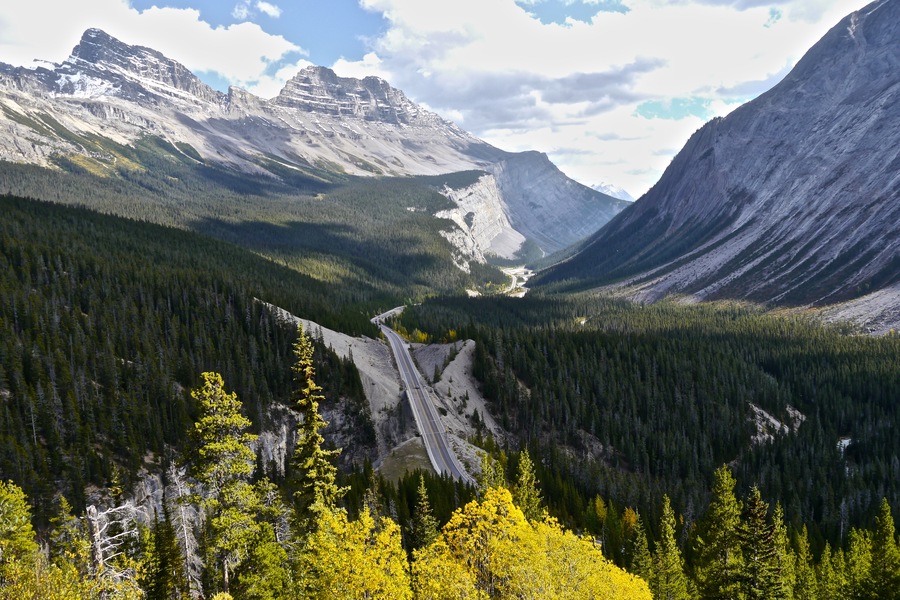
Big Bend is a kink along the ribbon of highway that extends from Banff to Jasper. The attraction lies at the northern terminus of Banff National Park, in the shadow of the 9,000ft Big Bend Peak.
The view of granite peaks from the Big Bend pullout is an unmissable highlight of the Icefields Parkway.
-
THE COLUMBIA ICEFIELD
The Columbia Icefield straddles the border of Banff and Jasper (though I think it technically lies north of Banff’s confines). It is the largest ice field in the Canadian Rockies, measuring an area of 325 square kilometers.
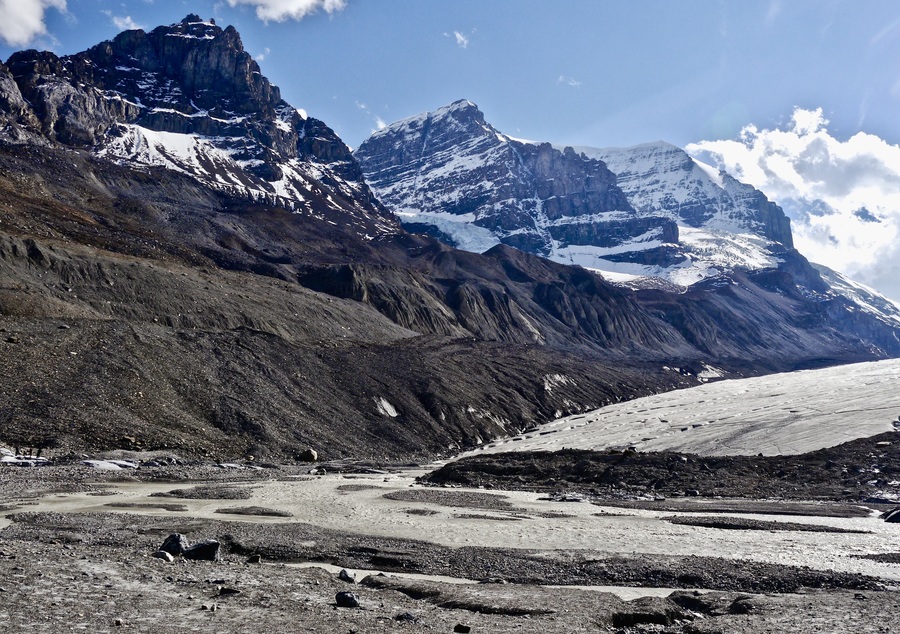
From the Icefield Discovery Center, you can book excursions onto the glacier.
However, having already been to the expanding Perito Moreno Glacier in Argentina and the Mendenhall Glacier in Juneau Alaska, Dan and I chose to bypass the experience in favor of spending more time at the other Banff attractions.
LAKE MINNEWANKA
Lake Minnewanka is located 13km east of Banff Town. The scenic recreation area has plenty of hiking, swimming, sailing, boating and fishing opportunities.
A level path surrounds the lake and provides a good strolling option for casual hikers and families with kids.
OTHER THINGS TO DO IN BANFF
The Canadian Rockies are a magnet for thrill-seekers, adventurers, and outdoor enthusiasts.
If you’ve got more than one day in Banff, you’ll have a plethora of different ways to fill your time—from glacier hikes, to skiing, and from canoeing, to gondola rides.
HIKING IN BANFF
Though many of Banff’s top attractions can be accessed by vehicle, you’ll want to lace up your hiking boots in order to appreciate the area’s lakes and mountains from a different vantage point.
During our long weekend in Banff, Dan and I hiked the Plain of Six Glaciers, in addition to a few short lakeside trails.
On a return trip to the park, we would love to tackle some of the area’s other spectacular pathways.
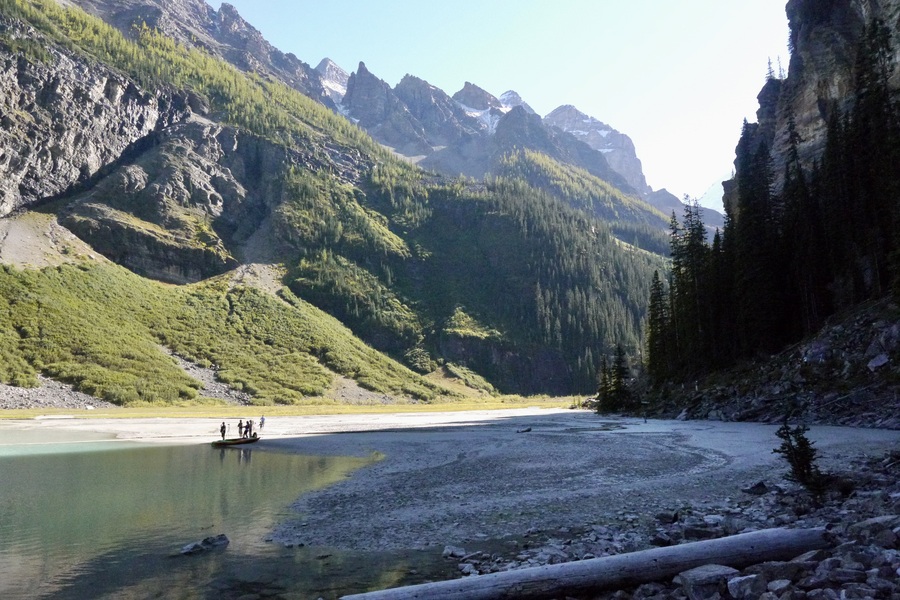
Banff National Park is one of the world’s best hiking destinations.
Top-rated hikes in Banff include the Johnston Canyon, the Cory Pass-Mt Edith Circuit, and the Cascade Amphitheater.
KAYAKING AND CANOEING IN BANFF
With its stunning chain of turquoise lakes, Banff National Park is a renowned kayaking, paddle boarding, and canoeing destination.
Canoeing in Lake Louise is among the top things to do in Banff. Other popular lakes for water sports include Moraine Lake, and Lake Minnewanka.
Each of the three lakes has boat rentals, though prices are quite high and can easily approach $100 per hour.
If you have your own paddling device, you can also consider Bow Lake, the Vermillion Lakes, or Emerald Lake.
SKIING IN BANFF NATIONAL PARK
The Canadian Rockies boast some of the best snow on the planet, in addition to beautifully varied terrain, spectacular views, and one of the longest ski seasons anywhere.
Banff Town is the main hub for three world class ski resorts—Mt. Norquay Ski Area, Banff Sunshine Village and Lake Louise Ski Resort. Known as the Big 3, the resorts draw visitors from around the world during winter months.
THE BANFF GONDOLA AND CHAIRLIFT
While hiking in Banff is a no-brainer, it isn’t the only way to summit the park’s mountains.
Located five minutes outside of Banff Town, the Banff Gondola provides a birds-eye view of six different mountain chains.
Taking a gondola ride up Sulphur Mountain is one of the top things to do when traveling to the area with kids. It costs $65 per adult.
Alternatively, you can ride up the Mt Norquay Chairlift in summer for views of the Spray and Bow valleys.
Chairlift rides cost $43 per person.
WHERE TO STAY IN BANFF
Banff Town is home to most of the national park’s accommodation options.
If you’re planning on staying in the park’s tourism hub, you’ll be privy to restaurants, bars, and the area’s largest selection of hotels.
Still, for budget travelers, pickings are slim within the boundaries of the national park. The Banff Inn provides one of the more affordable options in town. Alternatively, the Banff Boutique Inn offers a comfortable place to stay that is equipped with kitchen access and a dining area. It is perfect for extended stays in the park.
Just outside of town lies the Fairmont Springs—one of the park’s famous historic resorts. Dating back to 1888, it is styled after a Scottish Baronial castle. The hotel is a National Historic Site.
Outside of Banff Town, you’ll find some additional hotels at Lake Louise Village. Overnighting near the lake allows you to stay in a peaceful setting, just a stone’s throw from the park’s most popular destinations.
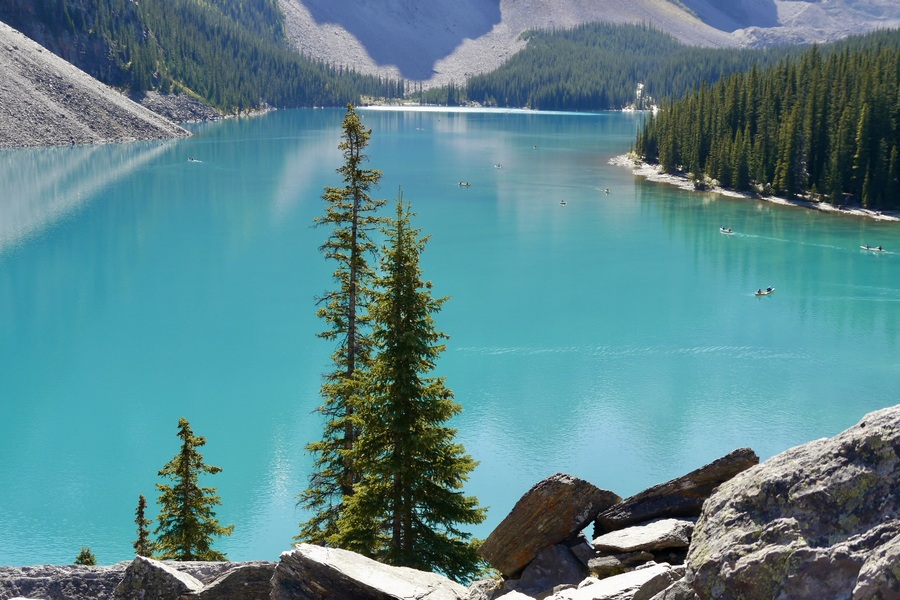
The Lake Louise Inn and Paradise Lodge and Bungalows are two of the best places to stay in the area.
Situated on the lakeshore, the historic Fairmont Chateau is difficult to surpass. It is the most renowned accommodation in Banff National Park and the top place to stay if you’re looking to splurge.
GETTING TO BANFF NATIONAL PARK
Calgary is the gateway to Banff National Park. The city boasts an international airport that connects Alberta with destinations throughout Canada, the United States, and Europe.
If you’re traveling the 1.5 hours from Calgary to Banff, a car will be your best option. Traveling with your own vehicle gives you freedom to experience the park at your leisure.
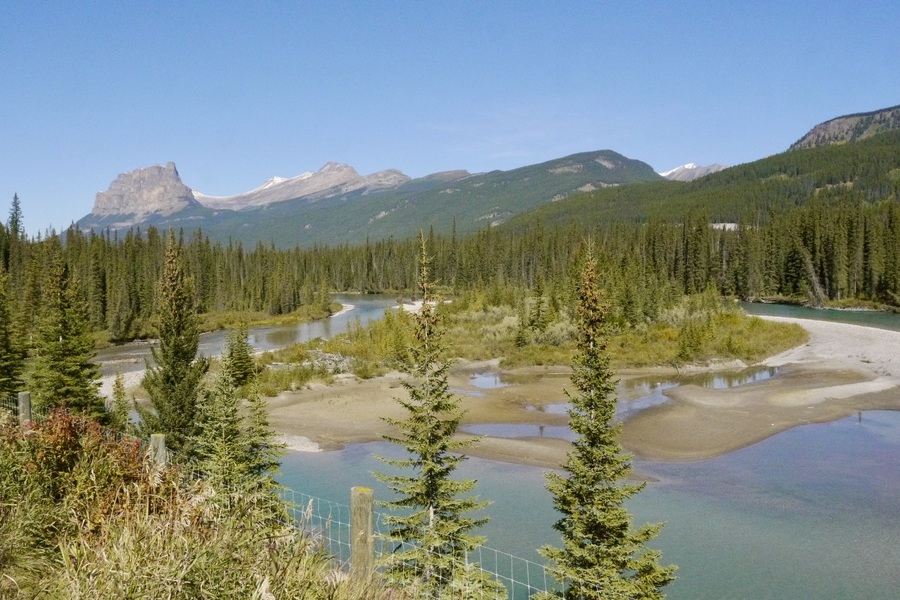
If traveling by private vehicle is not an option, however, there are shuttle buses and airport transfers available between Calgary and Banff.
The Brewster Express and RTB Tours offer transport between Calgary and the national park starting at $50 each way.
BEST TIME TO VISIT BANFF NATIONAL PARK
Depending on what you want to do, Banff can be seen as an almost year-round destination (though Fall and Spring are generally seen as gambles weather-wise).
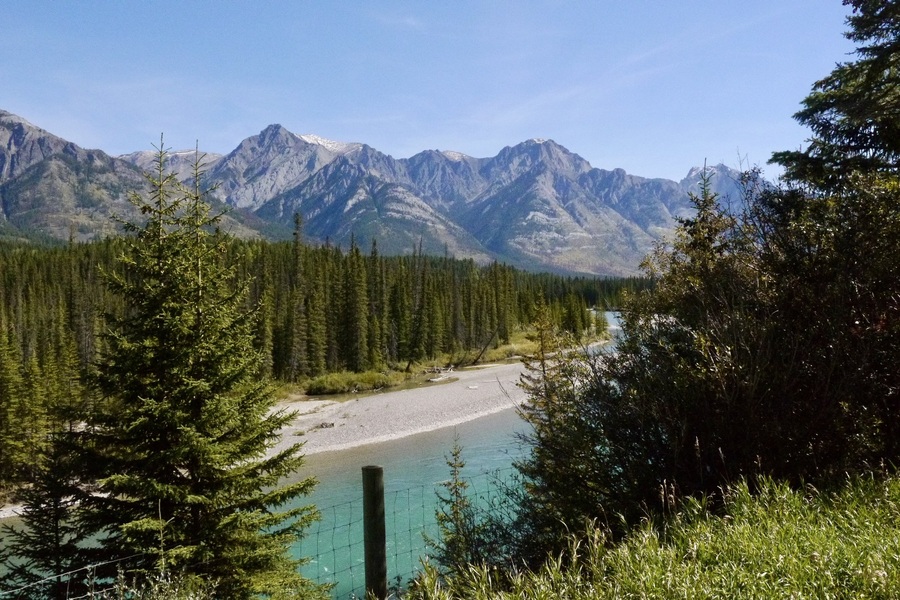
The national park has two main tourism seasons: Summer (June-September) and Winter (December-March).
During Summer months, Banff is a wonderland for hikers, mountain bikers, and lovers of outdoor adventure.
In winter months, the national park beckons skiers and snowboarders to its powder-covered slopes.
****
Banff National Park is one of North America’s ultimate bucket list destinations.
The national park is breathtaking. Photogenic. Wild.
I said it a zillion times during our visit to the Canadian Rockies and I’ll say it again and again:
Banff is nothing short of amazing.
________________________
Did You Enjoy This Guide to Banff National Park in the Canadian Rockies? Pin It!
